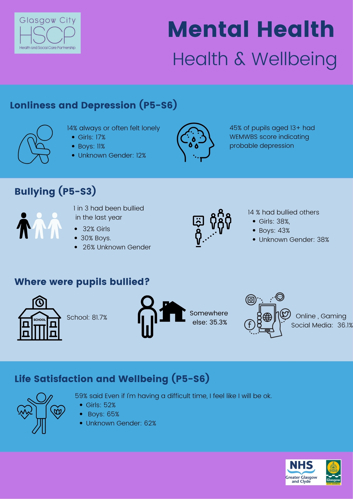The Scottish Government’s Mental Health and Wellbeing Strategy (2023) aims for a Scotland free from stigma and inequality. It focuses on early intervention and prevention from pre-birth to adulthood. Health and wellbeing are key parts of the Curriculum for Excellence, supported by a whole-school approach and Getting It Right For Every Child (GIRFEC).
Mental health spans a broad spectrum, from everyday emotional well-being to serious mental illnesses that require professional support. The World Health Organization says mental health helps people manage stress, work well, and take part in their community.
In 2023 - 2024, 430,000 children in the UK were referred to mental health services, but many faced barriers to getting help. Mental health issues often start early, with half beginning by age 14. Outcomes are worse in deprived areas, where suicide rates are four times higher. Risk factors include adverse childhood experiences, minority backgrounds, domestic abuse, chronic illness, disabilities, parental mental health issues, and refugee status.
Schools provide stability, routine, and support for mental health through GIRFEC wellbeing indicators and a whole-school approach. Issues like bullying, transitions, and exams can affect wellbeing, but schools can take positive actions to help build resilience. Teachers and staff play a key role in promoting mental health, and there are a range of resources and training opportunities available to help them.
Health and Wellbeing Census Scotland 2021- 2022
The data shows that positive mental health and wellbeing decreases with stage, and there are differences by sex and deprivation. For pupils up to S4 positive perceptions of life satisfaction, confidence and loneliness decrease but there are small improvements (or no further decreases) for those in S5 and S6. The percentage of pupils who say their body and the way they look affects how they feel about themselves increases as children and young people get older. The survey also asked pupils about time spent online.
- Pupils in P5 – P7 are more likely to spend three or more hours on electronic devices on weekdays and at weekends
- Pupils in S1 – S6 are more likely to spend 6 hours or more on electronic devices on weekdays and at weekends.
- Pupils in the most deprived areas in S2 – S6 were more likely to have problematic social media.
- Girls were also more likely to have problematic social media use than boys.

View the full School Health and Wellbeing Census 2021/22 here.![]()

 .
.